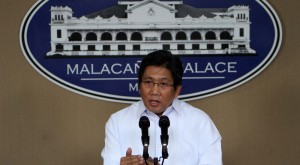We’re rushing Bangsamoro law–Palace
MANILA, Philippines–The government is rushing to complete the review of the Bangsamoro Basic Law with Congress set to adjourn sine die next week, but wants to make sure its provisions are constitutional, a Malacañang official said.
“We are aware of the time constraints. The sense of urgency remains on the part of government,” Communications Secretary Herminio Coloma Jr. said in a press conference.
Coloma said that in reviewing the Bangsamoro Basic Law, the legal team of the Office of the President wants to ensure that all the bill’s provisions are faithful to the Constitution.
“If there would be serious legal challenges to [the proposed law], it would also delay the implementation of the Bangsamoro Basic Law,” he said.
Strategic importance
Article continues after this advertisementColoma said the government recognizes the “strategic importance” of the creation of a Bangsamoro autonomous region for the entire country, particularly its contribution to the whole nation’s economy.
Article continues after this advertisementMalacañang has been criticized for the delay in the transmittal of the Bangsamoro Basic Law to Congress for approval.
But a Palace official said that the review was not as simple as drafting a bill renaming a street.
“… [That way,] people can’t say it was only passed because P-Noy (President Aquino) pushed for it. This is not a law that is just like one renaming a street, where you tell lawmakers to ‘just sign, we don’t care.’ What we’re saying is, all of us have a say here. Congress knows it is an important law. It needs to go through a process that no one could question,” Presidential Peace Adviser Teresita “Ging” Deles said.
Announcement forthcoming
But Deles said that progress was quietly being made in Malacañang’s delicate review of the measure and that a major announcement was forthcoming.
“This is an important law. I certainly want it to be debated rigorously… so that when it is passed, people will know that this passed through the process, that all possible questions that could be posed has already been asked,” Deles told reporters on the sidelines of a reception at the residence of British Ambassador to the Philippines Asif Ahmad.
The Palace has drawn flak over the delay with Congress set to adjourn on June 14 for a six-week break. The Executive’s failure to file the draft measure before Congress goes to recess would mean further delays in deliberations on the bill to late July, after session resumes on the 28th of that month.
But Speaker Feliciano Belmonte would rather that Malacañang submit the draft bill after the President’s State of the Nation Address (Sona) next month, rather than in the last few days of Congress’ session.
Belmonte said that if the bill would be submitted now, Congress would not be able to discuss it comprehensively because it was set to hold its last session day on June 13. The next session would resume after the Sona.
‘Almost sure’
Deles said she was “almost sure” that Malacañang would make an important announcement soon “especially since Congress is going on recess.”
She said a Palace spokesperson, not her, would make the announcement.
“This is a matter of imagining what this political agreement will mean when you put it legally into operation, that it is really something that is going to work… So the Office of the President needs to look closely if this will be the best [version],” Deles said.
The draft bill hopes to encapsulate the spirit of the Comprehensive Agreement on the Bangsamoro (CAB), a historic pact that the Philippine government and the Moro Islamic Liberation Front (MILF) signed on Mar. 27, ending 17 years of negotiations. The agreement would institute a Bangsamoro autonomous region in Mindanao.
Taking time
Given the complexities of translating CAB into law, Deles said finalizing the measure could really take time.
“Just imagine the CAB, how much time it took. Now, you’re going to put that into legal form. The CAB was written as a political agreement. When you do it into law, you have to look what other laws it might conflict with. Otherwise, all the debate will have been done,” Deles said.–With a report from Leila Salaverria
